 |
|||||||||||||||
|
|||||||||||||||
 |
||
|
 |
||||||||||||
|
||||||||||||
 |
|||||||||||||||||||||||||||||||||||||||
|
|||||||||||||||||||||||||||||||||||||||
|

TV’s Bad
News Brigade
ABC, CBS and NBC’s Defeatist
Coverage of the War in Iraq
By
Rich Noyes,
Research Director
October 13, 2005
Page 2 of 2
|
More Stories of Wrongdoing than Tales of Bravery and Generosity Besides depicting American soldiers as victims of terrorist violence, 79 stories focused primarily about allegations of wrongdoing against Americans in Iraq, including numerous follow-up stories about prisoner abuse at Abu Ghraib, new charges of U.S. abuse of prisoners, claims that the American military had killed civilians in mistaken attacks, and even charges that a U.S. Marine murdered two Iraqi prisoners. The networks offered heavy coverage of the accidental shooting in March of an Italian journalist, Giuliana Sgrena, who had been kidnapped by terrorists and who had been released into the custody of a top Italian secret service officer, Nicola Calipari. When Calipari and Sgrena were being driven at high speed to the airport, American soldiers at a military checkpoint signaled for them to stop, then opened fire. Sgrena was wounded, Calipari killed. Recuperating from her wound in Italy, Sgrena charged that the soldiers had intended to kill her. “I can't exclude that I was the real target of the shooting,” Sgrena said on Italian state television just days after the shooting, a charge picked up by NBC. CBS’s Allen Pizzey relayed that her partner, Pierre Scolari, “accused the Americans of ambushing the car because, he claimed, she knew things they did not want published.” Angela Pascucci, a colleague of Sgrena’s at her newspaper, Il Manifesto, told ABC’s Mike Lee that the American soldiers were lying about the incident: “No, their car wasn’t going fast. And she couldn’t hear anything.” Lee asked, “No warnings?”
If wrongdoing by soldiers merited such attention, what about the heroism or good deeds? All three networks did produce such optimistic stories, but very few — just eight that focused on episodes of valor and heroism, and nine that featured acts of kindness and generosity from American soldiers.
And all of the networks covered the April 4 ceremony where the young son of Sergeant Paul Smith accepted the Medal of Honor on his late father’s behalf. As NBC’s Andrea Mitchell explained, “The 33-year-old sergeant and his platoon were trying to secure the airport when they were attacked....In the firefight, a company of at least 100 Iraqis hit an armored personnel carrier, wounding the three soldiers inside and leaving their .50-caliber machine gun unmanned. Braving a hail of Iraqi bullets, Sergeant Smith jumped onto the gunner's position and fired back, exposed from the waist up.” “He could have fallen back. Instead, Smith used three boxes of ammunition to kill as many as 50 Iraqi soldiers before being fatally struck in the head,” Mitchell continued. “One soldier, choosing to stand alone in the line of fire in order to save his men.” In a war where American soldiers are too often presented as casualty statistics or tainted by charges of misconduct, these positive stories of heroism and generosity were essential for balance. It’s unfortunate that news audiences saw so few of them.
Pessimists on the Road to Democracy Network coverage of Iraq was at its most hopeful the weekend that Iraqis voted in their first ever free, democratic elections. For a short while it was seen as an incredible transformation. Just two years earlier, Iraq was controlled by a brutal dictator; now, the country was set upon the path to join Israel as one of the Middle East’s only democratic states. But just days after the January elections, network reporters reverted to a more skeptical stance, with stories placing the heaviest emphasis on the problems confronting Iraqis on their road to democracy. Out of 343 stories that discussed Iraq’s political process, negative news stories outnumbered positive ones by a four-to-three margin (124 to 92), with another 127 stories providing a mixed or neutral view. More than a third of the stories featuring optimistic or hopeful developments were broadcast over the course of just two days, January 30 and 31, the moment of Iraq’s historic elections. With all three news anchors in Iraq, the networks gave the elections heavy coverage. While all of the evening news broadcasts had featured gloomy predictions before the vote, the large turnout and relative tranquility of the day provided a pleasant surprise. Of the 40 stories that focused on Iraq’s political process on January 30 and 31, fully 80 percent cast the situation in hopeful and optimistic terms.
“Freedom. Happiness. Victory,” came the enthusiastic reply. Before the vote, reporters expected that Iraqi voters would be thwarted by terrorism. “This has to be the most dangerous political campaign in the world, with suicide bombings and assassination attempts just about every day,” ABC’s Wright fretted on January 9. As for election day itself, “there could be a bloodbath,” NBC’s Jim Maceda predicted on the January 17 Nightly News. Three days before the election, CBS’s Rather ominously passed along the terrorists’ threats: “Fear is running high as the insurgency’s campaign of intimidation left more Iraqis dead today. Bombs exploded at two Baghdad schools that are expected to serve as polling stations, and anti-election leaflets were everywhere threatening to, quote, ‘wash the streets of Baghdad with the blood of voters.’”
Journalists’ pessimism returned soon after the votes were counted. When Iraq’s newly-elected parliamentarians — representing parties that did not even exist two years earlier — were slow to name a new government, reporters voiced impatience. On April 21, NBC’s Richard Engel complained that the naming of a new government had been held up by “paralyzing horse trading.” Three days later, he declared that the Iraqi government “remains paralyzed by disputes over power....Too much negotiating, it’s dragged on since January.” Two weeks later, on May 8, Engel reported that while “Iraq finally has a nearly-complete government after nearly 13 weeks of excruciating negotiations” the country “in general, is floundering without decisive leadership.” Engel was hardly the only reporter seeing dark clouds. On August 12, CBS’s Sharyn Alfonsi was upset that women might be victimized if the new Iraqi constitution were too rooted in Islam. “Islamic hardliners who were contained under Saddam’s regime have re-emerged. Their teachings encourage men to discipline their wives and daughters and, as their views become more widespread, so too could domestic violence.” Two weeks later, on August 28, CBS’s Lara Logan chastised the Iraqis for failing to finalize their constitution: “Iraq’s unity is in question here in this hall, where their leaders were supposed to agree on a draft constitution inside this very hall. But instead, just hours before the midnight deadline, it stood empty. There is still no consensus, but at least the parties have not stopped talking....The constantly shifting deadlines have turned into political farce.” A few days earlier, when it became clear that the constitution submitted to voters would not meet all of the demands of the minority Sunni group, ABC’s Martha Raddatz posited the no-win situation facing the U.S. and the rest of the international coalition. Reporting from the Pentagon, Raddatz explained the reasoning:
Reporters were guilty of letting the disorder of day-to-day democratic politics blind them to the potentially wonderful story unfolding before them. Only occasionally, such as the January elections, did journalists lift their eyes from the messy details of Iraqi politics and focus on the revolutionary big picture. Another such occasion was after Lebanon’s “Cedar Revolution,” where peaceful protests helped lead to the withdrawal of Syrian troops who had occupied that country for nearly 30 years. NBC anchor Brian Williams saw the chance for a positive tide to sweep the Middle East, and allowed that some of the credit might rest with American policy in Iraq. Introducing a March 8 story, he described it as “a heady time for a White House that has been calling for the spread of freedom and watching it slowly break out in some spots.” Reporter David Gregory followed Williams: “The President boasted today that historic change is sweeping the Middle East, and he left little doubt he feels vindicated.” But from the White House lawn he warned, “they insist no one here is gloating. Today, the President said democracy in the region will require a generational commitment, even when the good news these days disappears.” When it came to Iraq’s democratic revolution, the good news disappeared from the network newscasts all too quickly.
The Networks’ Good News Believe it or not, there was good news to be found in Iraq. In fact, although such stories were easy to miss amid the depressing daily coverage, all three broadcast networks ran a number of stories documenting the progress being made by U.S. soldiers and the Iraqis themselves. While such positive pieces were a tiny fraction of the overall total, the occasional look at progress in Iraq offered crucial context to audiences exposed to months of discouraging news.
Now, Watt explained, “U.S. and Iraqi troops have turned it around.” The street is now patrolled exclusively by troops of the new Iraqi army, and “not one of them has been shot, not one killed,” Watt related. “A coffee shop owner thanks Iraqi soldiers for bringing peace. ‘I couldn’t even open my shop for five months because of the violence,’ he tells them. ‘Now, I stay open until midnight.’” Watt concluded: “They don’t call it ‘Death Street’ anymore.” Earlier in the year, on March 16, NBC’s Michelle Caruso-Cabrera reported on a hiring boom in Baghdad’s commercial district, reducing the country’s 30 percent unemployment rate. “More and more reconstruction jobs, from Baghdad’s airport, to Sadr City sewers, to the new television network are now going to Iraqis rather than foreign contractors,” Caruso-Cabrera disclosed. “One of the economy’s most vibrant spots: the Iraqi stock exchange. When the Iraqi stock exchange opened last summer, only 15 companies were traded here. Now there are more than 40,” she added. “Investors don’t want to miss their chance.” A few days later, ABC reporter Keith Garvin documented how U.S. reconstruction efforts were helping Iraq’s children: “One of the success stories is the Fine Arts Institute for Girls in Baghdad. After a $60,000 renovation, students are flourishing in their new environment. The school’s headmistress, Karima Hassan Ahmad, says with fresh paint, new supplies and a place to display their artwork, they’re expressing themselves like never before.” Last year saw major fighting in the Sadr City section of Baghdad, but CBS’s Kimberly Dozier found the situation much improved when she visited in June. Referring to the followers of Shi’ite cleric Muqtada al-Sadr, Dozier discovered that “now, once-armed followers of this radical cleric are working with Iraqi police. They’re an unarmed, plain-clothes neighborhood watch sanctioned by the U.S. military.” The truce in Sadr City has meant “U.S.-funded contractors [are] able to work, unimpeded by insurgent intimidation. In this neighborhood, a refurbished pumping station has kept the area free of sewage. The manager says now people are thanking her.” While other areas still need their facilities restored, Dozier said complaining residents are “trading barbs instead of bullets. And some Iraqis are starting to see the foundation of a better life.” In almost any other country, it would not be international news when a city pumping station is brought back on line, or a school refurbished. But in Iraq, each such step is an important sign of growing normalcy, a positive development at odds with the perception that Iraq is a nation in chaos.
When it came to another major task — recruiting, training and deploying a new Iraqi army — the networks made it the focus of just 22 stories, while it was mentioned in 83 others for a total of 105, about seven percent of the overall coverage. But more of these stories actually took a positive angle about progress in establishing a credible Iraqi army (36) than those emphasizing setbacks or problems (31), making this a comparatively bright spot in the coverage. Reporting on a July 24 suicide bombing in Baghdad, NBC reporter Kerry Sanders highlighted the praise of a U.S. army major for the way the Iraqi forces conducted themselves: “The Iraqi security forces here today have held firm. They are here and they are in charge. They have evacuated the wounded, they’re caring for the dead, they’re consoling the people who have lost loved ones. They are here for the Iraqi people.” On September 11, NBC reporter Peter Alexander noted another milestone in the coalition effort to rout terrorists from the northern city of Tal Afar: “It is the largest military offensive in Iraq since the assault on Fallujah ten months ago, with significant differences: the majority of soldiers here are Iraqi, backed by American armored forces.” Visiting Baghdad just before the January elections, NBC Nightly News anchor Brian Williams asked U.S. Army General David Petraeus, “Why do you think it is so dangerous right now? You and I could not walk into an open-air market right now in Baghdad.” The general disputed Williams’ premise: “We could. And I’ll do it if you want, in all honesty.” Narrating his January 28 story, Williams suggested General Petraeus was hardly the right test subject. “In all honesty, while he may truly mean it, when the general moves around it’s with massive security, the kind of armor plating strongly recommended for all visiting Americans.” Yet precisely six months later, on July 28, ABC’s World News Tonight went with Petraeus on exactly such a walk “on one of the most dangerous streets in Baghdad” without any American military escorts. Instead, the general’s security detail consisted solely of members of the new Iraqi army. Trusting the Iraqis he had trained, General Petraeus went up to a random street vendor and bought a Coke. He told ABC reporter Mike von Fremd the new Iraqi forces “do have a dangerous job. And they’re not shrinking from it. There’s not a case, since the elections at the end of January that we know of, where Iraqis didn’t fight back. And they’ve taken some pretty horrific losses at various times.” Over the course of the last nine months, the networks also reported on the capture of wanted terrorist leaders and successful military operations that killed or captured numerous insurgents. But perhaps the most important “good news” stories coming out of Iraq are no more exciting than the bland stuff of day-to-day life. Yet their importance cannot be overstated, for as the commercial, social and political life of Iraq slowly but steadily edges closer to normality, the coalition’s mission to liberate Iraq moves closer to final victory.
Conclusion: The Progress We’re Making in Iraq Is Too Important to Ignore
Over the course of the year, all of the
networks reported an erosion in the American public’s support for the
mission in Iraq. NBC took a survey in May asking whether “removing Saddam
Hussein from power was or was not worth the number of U.S. military
casualties and the financial cost?” More than half (51%) said the war was
not worth it, while just 40 percent said the benefits of invading Iraq
have been worth the cost. In mid-September, CBS asked if “United States troops [should] stay in Iraq as long as it takes,” or “leave Iraq as soon as possible, even if Iraq is not completely stable.” Just over half (52%) wanted our troops to leave as soon as possible, compared with 42 percent who thought it important to finish the job. Given the gloomy portrait that has been painted for them, the public’s mood is entirely understandable. Much of the reality of Iraq is still depressing, particularly the loss of American lives and the nearly-constant terrorist activity. But many of the soldiers who have served in Iraq think American media coverage has been too pessimistic, too focused on car bombings to really appreciate the progress being made on the ground. In the October 9 Pittsburgh Tribune-Review, reporter David Brown wrote about his conversation with Army Specialist Bobby Hillen, who saw enormous progress in the year he was in Iraq. “It was a drastic difference,” he told the reporter, as children went from playing in bomb craters to attending new schools. Hillen was upset that most Americans were not aware of all of the good work being done in their name. “It’s a slap in the face to a soldier when you turn on the news and all you hear are the negative aspects,” Hillen told the newspaper. Earlier this year, on NBC’s Today show, co-host Matt Lauer interviewed a group of American soldiers in Iraq. When they all reported that morale among the troops was high, Lauer was incredulous. “Don’t get me wrong here,” Lauer told the soldiers. “I think you are probably telling me the truth, but a lot of people at home [are] wondering how that could be possible with the conditions you’re facing and with the attacks you’re facing. What would you say to those people who are doubtful that morale can be that high?”
Just as it would be wrong for reporters to conceal the bad news (of which there has been plenty) journalists have an equal responsibility to fully inform citizens about the progress that is being made in Iraq. As the networks’ own polls illustrate, our citizens are trying to make up their minds about whether the mission in Iraq is likely to succeed or fail, whether our soldiers are working towards a result that will benefit American security and the cause of freedom. The conundrum is that the daily journalism on which they rely usually does not do a very good job of providing citizens with the kind of big-picture overview they need to make such important decisions. In the case of Iraq, TV journalists have spent much of their time following the terrorists’ agenda of violence and mayhem, pushing the accomplishments of our soldiers off the public’s radar screen. But there have been good things happening in Iraq, too, and it may turn out that the daily, not-so-glamourous work being done by our soldiers and the Iraqis themselves will turn out to be history’s big headline on the war. It is a challenge for journalists, especially TV reporters, to find ways to balance the dramatic daily attacks with the big picture of a country slowly but surely being restored and democracy dawning in the heart of the Middle East. But such balance is crucial, since it is ultimately the public that is watching all of this unfold on their TV screens who will decide if the mission in Iraq proceeds to victory, or is ended short of success.
The Media Research Center For an interview with an MRC Spokesman, please contact Tim Scheiderer at (703) 683-5004
Home | News Division
| Bozell Columns | CyberAlerts |





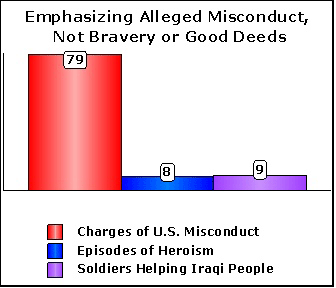 “No warning,” came the reply. Only NBC Nightly News, in a story reported
by Keith Miller on March 6, told viewers that Sgrena’s Il Manifesto was a
communist newspaper, and he could have added that long before the
shooting, she was a vociferous critic of U.S. policy in Iraq. A
surveillance satellite actually recorded the incident, and found that
contrary to Sgrena’s story, her car had to be going at least 60 miles per
hour. The U.S. military cleared the soldiers of any wrongdoing.
“No warning,” came the reply. Only NBC Nightly News, in a story reported
by Keith Miller on March 6, told viewers that Sgrena’s Il Manifesto was a
communist newspaper, and he could have added that long before the
shooting, she was a vociferous critic of U.S. policy in Iraq. A
surveillance satellite actually recorded the incident, and found that
contrary to Sgrena’s story, her car had to be going at least 60 miles per
hour. The U.S. military cleared the soldiers of any wrongdoing.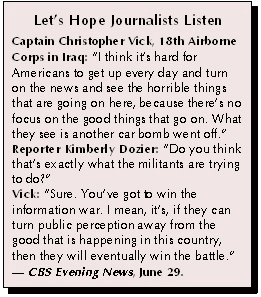 CBS, for example, told the story of Wisconsin Army National Guard Captain
Scott Southworth, who bonded with an Iraqi orphan with cerebral palsy, and
after six months of fighting red tape, was able to adopt the boy. ABC
saluted the 115th engineering group from Draper, Utah, who discovered a
five-year old Iraqi girl who needed a heart operation to survive. The girl
and her father made it to Portland, Maine in February, where doctors told
ABC that her prognosis was excellent.
CBS, for example, told the story of Wisconsin Army National Guard Captain
Scott Southworth, who bonded with an Iraqi orphan with cerebral palsy, and
after six months of fighting red tape, was able to adopt the boy. ABC
saluted the 115th engineering group from Draper, Utah, who discovered a
five-year old Iraqi girl who needed a heart operation to survive. The girl
and her father made it to Portland, Maine in February, where doctors told
ABC that her prognosis was excellent.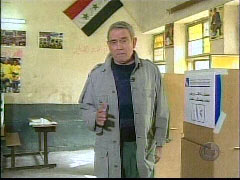 “Iraqis came out by the many millions, literally, to take part in an
Election Day pilgrimage,” CBS anchor Dan Rather enthused from Baghdad’s
“Green Zone” on January 30, the day of the vote. “By the time the polls
closed today, the celebrations spoke of a new Iraq, one with the potential
for a future brighter than many people thought possible before the vote.”
The same day, ABC’s David Wright interviewed a Kurdish voter whose father
had been killed by Saddam’s regime. “Can you put into words what the
feeling was like when you put that paper in the ballot box?” Wright asked.
“Iraqis came out by the many millions, literally, to take part in an
Election Day pilgrimage,” CBS anchor Dan Rather enthused from Baghdad’s
“Green Zone” on January 30, the day of the vote. “By the time the polls
closed today, the celebrations spoke of a new Iraq, one with the potential
for a future brighter than many people thought possible before the vote.”
The same day, ABC’s David Wright interviewed a Kurdish voter whose father
had been killed by Saddam’s regime. “Can you put into words what the
feeling was like when you put that paper in the ballot box?” Wright asked.
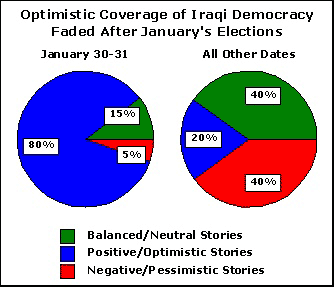 The next night, January 28, CBS reporter Elizabeth Palmer despaired that
“the first taste of democratic choice for many people will be a bitter
one. They not only have to decide who to vote for on Sunday, but when to
vote. One young man asked us this morning whether he’d have a better
chance of avoiding a terrorist attack if he went to the polls in the
morning, or the afternoon.”
The next night, January 28, CBS reporter Elizabeth Palmer despaired that
“the first taste of democratic choice for many people will be a bitter
one. They not only have to decide who to vote for on Sunday, but when to
vote. One young man asked us this morning whether he’d have a better
chance of avoiding a terrorist attack if he went to the polls in the
morning, or the afternoon.”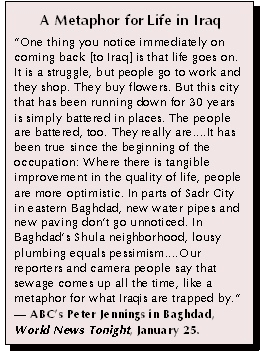 “This is a very, very worrisome development to some military officials and
defense officials in the building. Because if the Sunnis do not feel
empowered, they believe the insurgency will get worse.” But the Sunnis
could also compete in the constitutional referendum: “If they vote this
down, everything goes back to square one. The government dissolves, they
have to start over again.”
“This is a very, very worrisome development to some military officials and
defense officials in the building. Because if the Sunnis do not feel
empowered, they believe the insurgency will get worse.” But the Sunnis
could also compete in the constitutional referendum: “If they vote this
down, everything goes back to square one. The government dissolves, they
have to start over again.”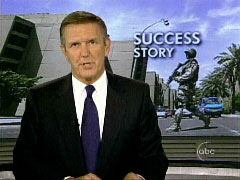 Back on June 29, for example, ABC sent reporter Nick Watt to check up on a
well-known trouble spot in Baghdad that has turned into a success story.
“Last year, Haifa Street became known as ‘Death Street.’ Insurgents set up
their own check points. They terrorized local people. They ambushed and
killed troops who ventured in.”
Back on June 29, for example, ABC sent reporter Nick Watt to check up on a
well-known trouble spot in Baghdad that has turned into a success story.
“Last year, Haifa Street became known as ‘Death Street.’ Insurgents set up
their own check points. They terrorized local people. They ambushed and
killed troops who ventured in.”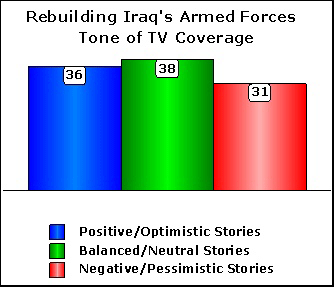 But in the first nine months of 2005, the networks ran only 10 positive
stories about the re-building of Iraq’s infrastructure, less than one
percent of the total coverage. And another 11 stories cast the rebuilding
mission in negative terms, focusing on jobs that still needed to be
accomplished or the slowness at restoring normal life.
But in the first nine months of 2005, the networks ran only 10 positive
stories about the re-building of Iraq’s infrastructure, less than one
percent of the total coverage. And another 11 stories cast the rebuilding
mission in negative terms, focusing on jobs that still needed to be
accomplished or the slowness at restoring normal life.
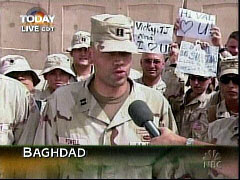 “Sir,
if I got my news from the newspapers also, I’d be pretty depressed as
well,” replied Captain Sherman Powell. “We are confident that if we’re
allowed to finish the job we started, we’ll be very proud of it and our
country will be proud of us for doing it.”
“Sir,
if I got my news from the newspapers also, I’d be pretty depressed as
well,” replied Captain Sherman Powell. “We are confident that if we’re
allowed to finish the job we started, we’ll be very proud of it and our
country will be proud of us for doing it.”